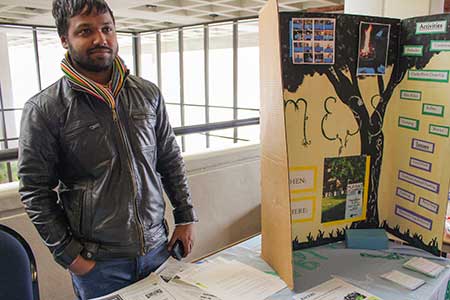
Members of MESS talk to students throughout the week in the Curris Center to bring awareness to environmental issues.
(WITH VIDEO) – After over six years of sporadically advocating for a “Green Fee” at Murray State, the Murray Environmental Student Society is still struggling to find their footing and concrete support for this project from constituencies around campus.
In 2009, MESS first proposed the idea of implementing a Sustainable Program Fund, a small rise in tuition for students which would go toward supporting green initiatives and research projects around campus.
The next year, MESS polled students to see if they would be in support of paying this fee in an amount of either $1 or $5, to which 85 percent of those polled said they would pay these amounts.
Since collecting this data MESS has accomplished relatively little in terms of implementing their Sustainable Project Fund.
The project was dropped for several years as leadership in MESS changed and goals shifted.
Kathryn Miracle, president of MESS, said they are still raising awareness of the cause and what positive changes the rebranded, Sustainable Project Fund might affect for Murray State.
She said the Sustainable Program Fund’s slow progress is due to MESS’s fluctuating leadership, direction and members’ discouragement in the project as time passes with little results.
“Right now, the way we are trying to get the word out about the Green Fee is to have events, whether it’s recreational or educational, to promote it,” Miracle said. “I think we definitely have a chance to make more happen this semester.”
At the beginning of this semester, MESS created a Sustainable Project Fund Committee focused solely on strategizing how best to move forward with this project.
Under the leadership of Grecia White, the committee head, the group is looking at other Kentucky universities who have implemented similar programs such as the University of Kentucky, Eastern Kentucky University and Western Kentucky University. White is also spearheading the effort to create a time line for the project.
“I just want people to know about it, to know the phrase, to know that this is something we can all have,” White said. “I want people to feel like, ‘yes, we can do this.’ But we have to work hard and just work as a group towards the same goal.”
White said it’s not student apathy stalling the Sustainable Project Fund, but MESS’s inability to coordinate its efforts and inform students.
“A lot of the students don’t even know about this fund – sometimes don’t even know about MESS,” she said. “I want to get everyone involved and feel excited about this and don’t get discouraged because it has taken us a long time.”
Paul Walker, chair of The President’s Commission on Sustainability, said he has encouraged MESS to continue their efforts to gain support.
He said, however, the Board of Regents has historically been against having a student fee.
“This idea has been around for quite a few years and it has been brought up numerous times from MESS to the commission,” Walker said. “The only way to get it done is to show significant student support for paying a fee and then approach the president’s office directly and show what they’ve found.”
MESS is trying to do just that. After scrapping petitions and polls form previous years and starting from scratch last semester they have few signatures compared to their overall goal.
Kyle Shupe, MESS’s Kentucky Student Environmental Coalition representative, said MESS wants to collect 1,500-2,000 student signatures before the semester ends. Their goal is signatures from 25 percent of the student body.
Shupe said they would like to see a Sustainable Project Fund implemented by May 2016, before the current officers graduate.
“The only thing you can say is lend us your support, come to our events so we can keep it going and go further than before by making more progress,” Shupe said.
Story by Ben Manhanke, Chief Videographer